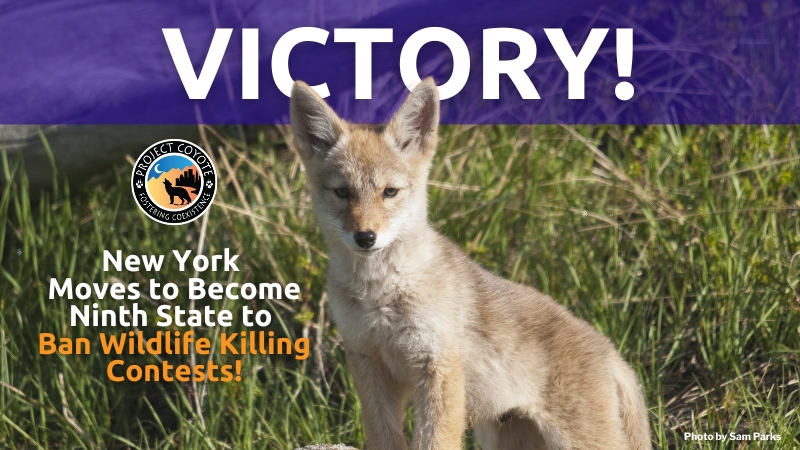FOR IMMEDIATE RELEASE – June 21, 2023
Media Contacts: info@projectcoyote.org, 415.945.3232
New York Moves to Become Ninth State to Ban Wildlife Killing Contests
Legislators Take Bold Action to Protect Wildlife and Ecosystems
ALBANY, NY – Today, New York legislators passed a bill (S.4099/A.2917) to ban cruel and ecologically destructive wildlife killing contests in New York—events in which participants compete for cash and prizes by killing the most, largest, or smallest of targeted wildlife species including coyotes, foxes, squirrels, and raccoons. The bill now heads to the desk of Governor Kathy Hochul for signing into law.
Killing contests occur despite our planet undergoing a biodiversity crisis in which wildlife populations have plummeted by more than two-thirds in the last 50 years–driven primarily by human activities. In the face of this ecological crisis, killing contests are directly contributing to the massive loss of wildlife, including species serving key ecological roles in our ecosystems, all while incentivizing the killing with cash and other prizes.
“We commend New York legislators for their leadership on voting to outlaw egregious and unscientific wildlife killing contests,” said Renee Seacor, carnivore conservation advocate for Project Coyote and The Rewilding Institute, “During an extinction crisis, with wildlife populations around the world plummeting, indiscriminate killing of wildlife for prizes is ethically indefensible, ecologically reckless and runs counter to sound wildlife conservation and management. This important legislation will help bring New York’s wildlife management into the 21st century.”
As public attitudes shift and increasing scientific understanding of wildlife dynamics continues to develop, advocates, state agencies, and legislatures around the country are moving quickly to end these contests. If signed into law, New York is on track to become the ninth state to ban wildlife killing contests, joining Vermont, New Mexico, Maryland, Arizona, Massachusetts, Colorado, California, and Washington. Oregon is also in the process of outlawing the contests and federal legislation was introduced last year to ban wildlife killing contests on federal public lands.
Participants justify these contests by claiming their necessity for wildlife management, specifically predator control. However, 30 years of countless peer-reviewed studies, including statements from the New York State Department of Environmental Conservation, have concluded that indiscriminate killing of coyotes, the most common target of killing contests, actually creates a rebound effect by increasing reproduction and destabilizing packs, which can cause numbers to grow. Last February, the 15th annual Statewide Coyote Contest, one of the state’s largest coyote killing contests in Sullivan County, boasted a new record of 124 dead coyotes in one weekend.
Killing contests target native carnivores like coyotes, who play a vital role in ensuring the health of New York’s forest and pastoral ecosystems. Coyotes provide natural services to our ecosystems by removing sick animals from the gene pool, restricting transmission of zoonotic diseases such as Lyme disease, and protecting ground‐nesting birds by limiting populations of mesocarnivores that prey on birds and consume their eggs.
Coyote killing contests also threaten wolf recovery because of the similarities between large Eastern coyotes and wolves and the increasing likelihood that endangered wolves may be killed. Wolves are a listed endangered species under both federal and New York State law, and the killing of wolves is prohibited in New York. In December of 2021, a large canid that was shot near Cooperstown was confirmed by a subsequent DNA analysis to be 98% gray wolf. Coyote killing contests award prizes for the largest “coyote” killed, thereby increasing the chances that endangered wolves may be killed.
###
Project Coyote, a fiscally-sponsored project of Earth Island Institute, is a North American coalition of scientists, educators, conservationists, and community leaders promoting compassionate conservation and coexistence between humans and wildlife through education, science, and advocacy.

